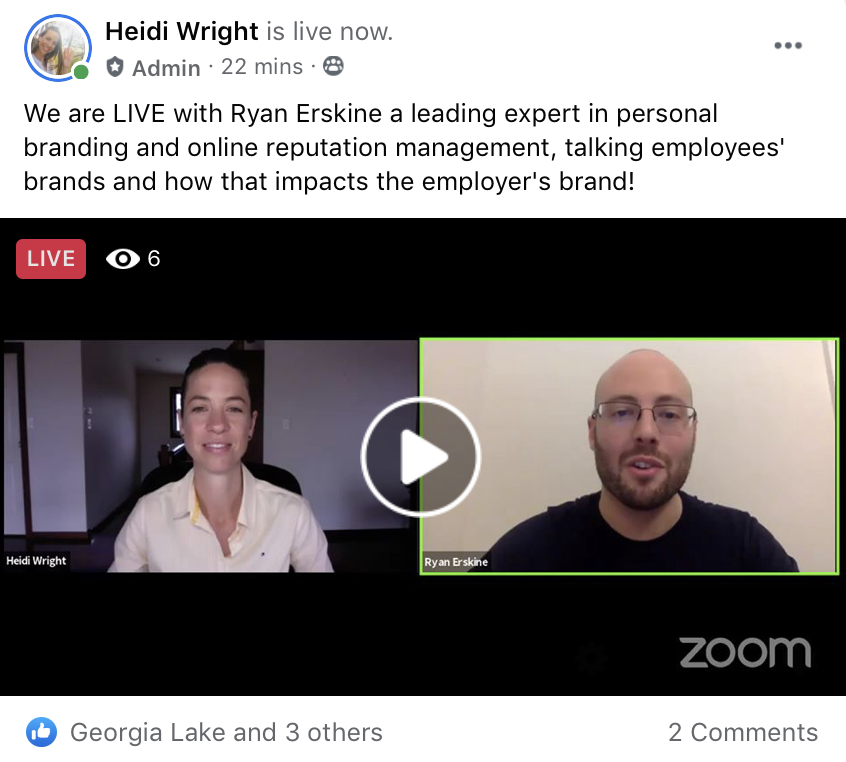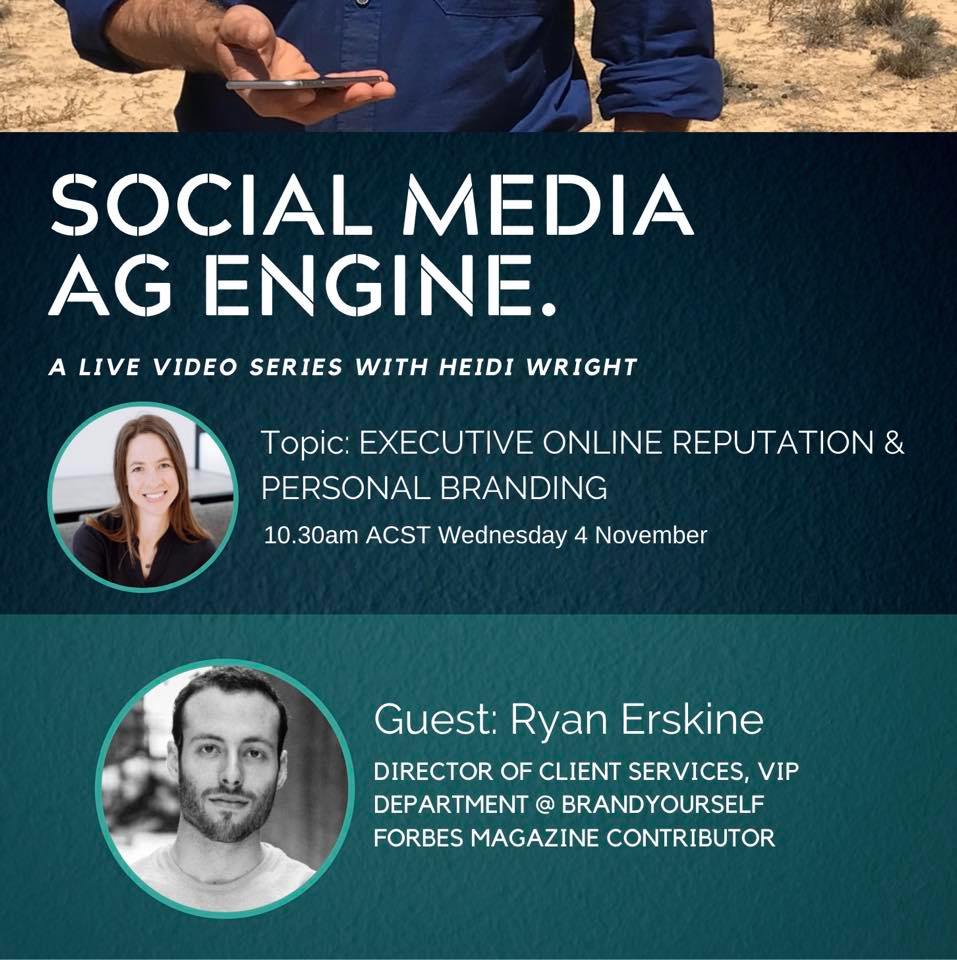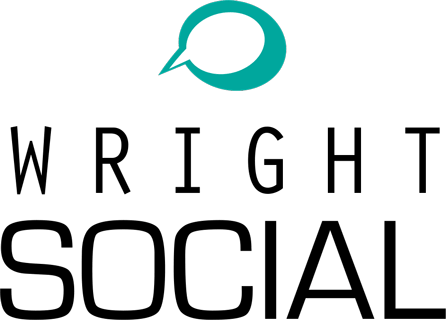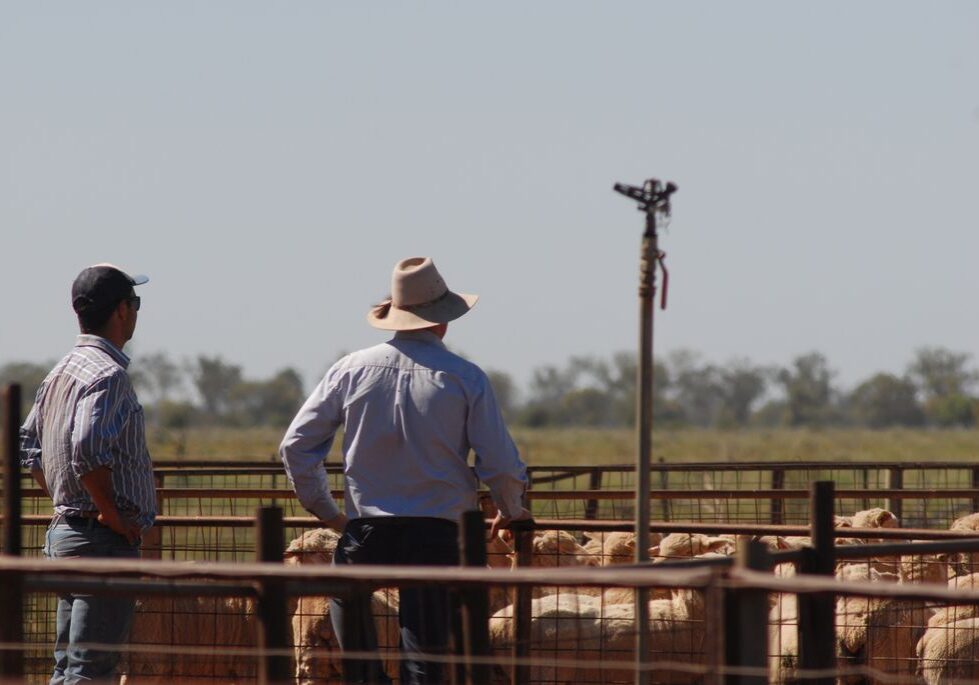Digital Ag Engine is a live video series with Heidi Wright, Director of Wright Social.
Heidi talks with LIVE in the “Get Customers For Your Ag Business Using Social Media Group” with Ryan Erskine, the Director of VIP Client Services at BrandYourself, and a leading expert in personal branding and online reputation management.
Ryan helps individuals and businesses develop their personal and corporate brands, take control of their search results, and position themselves as thought leaders in their industries. He’s the author of Online Reputation Management: The 28 Day Challenge, and his writing has been featured in Forbes, Entrepreneur, Social Media Today, and Huffington Post.
The LIVE 20 minute chat covers:
– Managing your online reputation
– What are the benefits of a personal brand for business executives?
– How to approach the personal branding puzzle when it comes to employees?
Let’s get started!
Heidi Wright
Ryan, I read one of your blogs, which sparked some curiosity around personal branding domain, and how we can better support and empower our employees to represent our brand and actually become sales champions. There’s a lot of costs and strategy that goes in behind that.
Ryan, you’re a leading expert in personal branding and online reputation management. And you’re also an author of the 28 Day Challenge, which is cool. And you are contributor to a lot of our key, widely read magazines being Forbes, Entrepreneur, Social Media Today featured in Huffington Post. And currently, you’re the director of VIP Client Services at brand yourself.
Ryan Erskine
Thanks for having me.
Heidi Wright
Really happy to have you here. I’m really happy. So what we’re going to cover is we’re going to look at managing your online reputation for agribusiness executives, what are the benefits of a personal brand for employees? And also, how do we approach that? I guess, personal branding puzzle when it comes to employees, how can we project them as part of our company, but also support them to have their own personal brand?
Ryan Erskine
Excellent.
Heidi Wright
Let’s kick into it. 20 minutes is going to go so quickly. So I always say you know whether or not you know it, or like it, everyone has a personal brand, particularly online, because you just Google your name and you’re going to come up whether or not someone’s mentioned to you on a Facebook post, or your profile on LinkedIn, or even like an ABC News article from 10 years ago.
What are your thoughts around managing your personal brand and not let Google take a ride on you?
Ryan Erskine
Yeah, I completely agree. The way I think of it is if you’ve spoken to a client recently, if you’ve networked, you’ve given out a business card, you should absolutely assume that you’re being googled.
And some people don’t realize how important their online presence is until they actually have a problem. And then they hear about it all the time. Right? Because then people are asking about something unfortunate that showing up and you know, then it’s a hindrance, but if there’s nothing good, they may not hear about it yet because people are just like, not finding anything good not finding anything that maybe they don’t move forward with you as a business relationship because they couldn’t find something critical about you.
What’s interesting is I speak with a lot of business In this owners who are frustrated because the word of mouth doesn’t quite mean the same thing that it once did, there’s more of a due diligence process. Now, that involves a good deal of that online research.
And one of the one of the most telling statistics is that around 84% of people trust online reviews as much as a personal recommendation.

And so you can imagine what a handful of negative negative reviews might do to a business when, you know, you have maybe one personal recommendation, but then all these negative reviews online that are saying the opposite.
Ryan Erskine
So I figure with so much riding on our online presence, it’s really just too risky to let the web control what’s out there, I would much rather be in the driver’s seat.
I’m sure many that are listening can agree like, I would never let someone random write my resume. I mean, that just sounds so obvious, right? But my resume, I want control over that. And the same, the same for my digital footprint, like I, if that is just as important these days to, you know, making it with an employer with an investor with a business partnership, I would much rather have control over that piece, then, you know, whatever Google happens to find about me online.
Heidi Wright
100% agree with you there
Heidi Wright
In your opinion, is there a difference between professional and personal brand?
Ryan Erskine
So I really think they’re the same thing, or they’re kind of pointing to the same thing. So the term at least in in the way that we use it, the term personal brand is really meant to distinguish a person from the organization. So like a corporate brand, is of the organization itself, we’re all very familiar with that. And personal brand would be more like the executive, the CEO, the individual, so someone’s personal brand. Meaning like just the individuals brand.
So a great personal brand does have aspects of both professional and personal, which is why I think those terms get tossed around. But really, it’s going to have in order for us to feel relate relatable to someone else online, we want our brand to feel personal and it needs to be professional. Otherwise, it’s probably not doing us much good in the business world.
Heidi Wright
Yes exactly. Effective personal branding will differentiate you from others in your professional field, right? And I guess it will project your unique skills and experiences that that make you, you.
So what are the steps that we can take that help us build the foundation to our personal brand? Particularity for those people just not sure where to start? What would be some of your sort of top tips there?
Ryan Erskine
Sure. So number one is actually assessing the situation like what is coming up for you, right? So googling your name googling your business?
Let’s actually figure out what what’s the negative, what’s the positive a full audit, you may find that there’s absolutely nothing out there, in which case, you’re probably working with a bit of a blank slate, maybe there’s a little bit that you’re working with.
If there’s anything negatives, that’s good information to because it lets you know what other people are finding about you as well.
So that’s step one, step two would be starting to build out some of the assets that you want to rank for you and your Google results.
So if you don’t already have a LinkedIn, Twitter, any of the key social profiles that a your audience might already be using regularly. That’s absolutely table stakes at this point. Nobody should be without those. And then there are other pieces to consider in terms of a corporate website bio page about yourself.
So CEOs or executives will often be on the website, but not ranking well for their name. So sometimes the website just not coming up. So there are some steps we can take to optimize the bios that we have on our personal websites or on our corporate websites to make sure that they do come up in search results.
One tip I like to give is to use the bio in the third person. So if we say, rather than I am the founder of Wright Social, we could say Heidi Wright is under a Wright Social. And the reason for that is Google doesn’t know who I am I, but they know who Heidi Wright is – Google’s pretty smart, but they’re not that smart yet. So sometimes, just giving a few more tips and hints to Google can help steer things in the right direction.
Heidi Wright
Fantastic. And that really comes down to making your bio keyword optimized?
Use keywords in your bio of the terms you know people are searching on…
I recently gave a presentation through The Livestock Collective to a group of individuals. And I touched on personal branding. A lot of the group weren’t necessarily business owners, they weren’t looking to grow their business, they were just individuals wanting to increase their positive impact of their industry have positive influence. Some were on the lookout for career or development opportunities. So would you recommend also switching out your bio description based on what employers at that point in time may be searching for, if you’re looking to come up on LinkedIn, in front of a potential company, for example?
Ryan Erskine
Certainly, what’s really nice about a personal brand is that you can change it and evolve it as you change and evolve.
So like, if you don’t have control of your Google results, then whatever comes up is whatever comes up. But if you have a personal website, ranking in the number one position, let’s say, and then your potential employer or business partner, whoever were to look you up today versus five years from now, well, it’s still going to be ranking there five years from now. And so now you get to evolve the website in the same way that you’re evolving your brand. So if you’re, you know, you’re steady at a job today, but in five years from now, you’re moving in a different direction, you can alter all the keywords on your LinkedIn, on your personal website, etc. And now you you still have control of what’s showing up in Google results, but it portrays a different picture. Does that make sense?
Heidi Wright
Yes. I like to think of it as building an additional channel for your success. So you can mould that how you like.
Okay, so what are some of the hesitations or fears you find people have around establishing a personal brand?
I know, we haven’t really covered on the benefits of personal branding, but I feel like people understand that already.
So if we move into some of the fear factors, I mean, some people will say, “Who am I to have a personal brand?” Or “if I build a personal brand are people going to think I’m big noting myself?”
From your perspective, having dealt with hundreds of people seeking a pathway in personal branding, what have some of the fears been?
Ryan Erskine
So that typically comes down to either a fear of looking bad, or an uncertainty around what needs to be done to look good. There’s usually some level of anxiety there. But I think it’s just too important, as we’ve discussed, right?
50% of people are finding that they have something negative out there online about them.
And they may not even be something that they realize like it could be a previous employee that wrote something, you know, negative review about the company, or an ex girlfriend that started bad mouthing them on a forum.
I mean, you see everything.
I think it’s just too important to get caught up in the fear and anxiety and uncertainty of how we might look or appear to other people.
What’s really interesting from a b2b perspective, is that customers today progress about 70% of the way through their decision making process before they ever engage a sales representative or anyone happy organization. And so what a lot of people do is they focus on the latter 30%, which is more like pricing and discounts and sales tactics, but then we’re missing everything that’s happening in the first 70%. And we’re wondering why our pipelines not filling up, right. So that’s why most buyers are saying today that offenders online presence, their online content, what they’re putting out on the internet is having a significant impact on their buying decision. And it makes sense because that’s what’s actually helping them through that first 70% of the decision making process. So when it comes down to some of those fears and anxieties, it’s – we get this with clients all the time, even when they know that they want to do it – they’re still like wrestling with this internally.
And so we have to just work through, “what’s going to feel most comfortable to you?”. Here’s an example of other folks who are industry leaders who are doing this.
It’s all about looking at what’s actually happening out in the industry, and how you can position yourself to help your customers. And not not focusing too much on, “how I’m going to feel if someone thinks of me the wrong way – we all know that’s human nature to think about that.”
Heidi Wright
Some really good points there. And I think, you know, that big factor in ag for us is really trust. And if we can use our content and leverage our personal brand to gain that trust, people want to do business with people, you know, results get done through people. So it’s about forming that through the content with your personal brand. People call you and it’s an easy sale. If you’ve got a solution that people want and you position yourself as that trusted advisor, why would they go with anyone else? Right?
Ryan Erskine
Yes.
I think we culturally have this fascination with brands, but then sometimes forget that it’s really the people that we’re doing business with. And it’s like, on the one hand, we have this desire to have a loyalty towards some of our favorite brands. But then we realize, like in our, in our day to day businesses, we’re actually working with other people. I love Apple, and on the other hand, that has that brand affinity has very little to do with my day to day b2b interactions. And I’m sure in the ag sector, you guys can, you know, can understand the same thing.
Heidi Wright
All right. Well, let’s move into the personal branding puzzle when it comes to the employers seat. We know how critical it is, for some industries, for the leaders to be their face of the business.
How can we better harness our employees and their personal brand and journey? So it’s a win win.
So they’re feeling true to themselves and their personal brand? And they’re feeling like they’re building their career whilst also contributing to that broader company vision?
Ryan Erskine
Yeah, that’s absolutely key, because we don’t want employees to feel like they’re obligated to do certain things. Because I mean, that’s a great way to build resentment, first of all, which we definitely don’t want. But if there’s a way to empower employees to build their own equity as a professional, and further the business, that’s more of a that’s that kind of win win situation that most employees will get behind if they, you know, if they’re bought in at all to the organization that they’re a part of, because it means they’re going to be more valuable to you as the employer, and they’re going to be more valuable to future employers if and when they decide to move on. Yeah, so a couple of things that businesses tend to do is gamify the situation.
So if we can create incentives, benchmarks awards for hitting certain kinds of goals, that can be helpful.
Another is to set guardrails. So there are so many tools for doing this LinkedIn Elevate is one tool, there’s a ton. And you can also just do it manually yourself. But the idea is to share content with your employees that is sort of like recommended pieces of content to share with their networks. They don’t have to, they’re not obligated. But maybe some of them are things that your organization is doing really well. For example, maybe you put out a media release, maybe you put out a piece of content on your website, and you want to share it around your network and employees get something like 561% more brand reach on their social media channels than the typical brand does. And it doesn’t mean that like all of your employees or social media influencers, although maybe, but usually what it just means is everyone has their own personal network. And so if we can get some of the brand’s messages to be shared across some of their personal networks, the reach is going to be so much higher than if we’re just trying to like blast customers with with our own brand channels.

Heidi Wright
There was some really good points. For those listening that the tools that you highlighted, do you suggest these are tools are only warranted for those at the corporate or larger company level? Are there some tools that you would recommend for say single executives or those of 10 staff that want to try some content sharing?
Ryan Erskine
At the low level, I would recommend finding some kind of manual tool for doing it. Like a lot of organizations are using already using communication tools like Slack, or Skype or something like that. So you can set up a channel. For example, “hey, this week, here’s a couple of new pieces of press that we want to share.”
It also doesn’t even have to be about the organization, it could be industry news, just a way of keeping your employees Top of Mind with their networks. As a way of like subconsciously keeping them part of the day to day conversation,
Heidi Wright
Let’s see, I find the biggest hurdle is the content creation piece, you know, having time or at least with the businesses that I deal with a lot of their staff, if they’re in the field on sales, they don’t have time to be putting attention on their personal branding, and furthermore generating that content to keep it living.
And I say, look, the least you can do, number one, is optimize your LinkedIn profile. Two, make sure that your about us section has the key elements to it, there’s a clean call to action. At the bottom of that about us, you’ve got a clear, updated title. And then share industry news articles relevant to your niche. So the company feeds the content, you simply go in, spend five minutes a day, share that content to your profile, look up a hashtag topic and find an article relevant to your niche, and comment. It can be five minutes, you know, don’t make it too hard. I find if staff put too much on their plate it becomes too overwhelming. It’s too hard. And they don’t do anything.”
Ryan Erskine
Right. Yeah, little little steps is key, at least to start right. And then if you get some of your employees really jazzed about it, maybe they start taking initiative and doing a little bit more. Yeah, we got to start somewhere.
Heidi Wright
Yes, exactly. Let’s talk about some of the risks. Head hunting, for example. So you’ve helped your employee navigate this space of personal branding, they’re your star employee, and then, they get headhunted? Because someone’s doing some stalking online and go, “Oh, that one looks good.”
Let’s spend a moment brainstorming some of these risks and work through them?
Ryan Erskine
Sure.
There’s undoubtedly an increased risk. When you encourage employees to generate their own content, or share things online. I think one that you’re pointing out is that these people are looking like stellar employees. And maybe other folks are interested as well. That’s a double edged sword. Because if you don’t empower your employees to do that, then they’re also not serving the same purpose for you either, right. So I think the risk of not supporting employee advocacy is really much higher for a number of reasons. On the one hand, you may have employees that are sharing content already online, but are not doing it in a way that’s very helpful or aligned with the business. So if you can help set some guardrails, maybe, maybe they’re already doing it, and you can help guide in the right direction. So that’s one another, there are folks who just won’t share things at all, unless, unless they have some suggestions from the company, like maybe they just don’t think of it, they don’t have the time. This is the point that you’re getting at now, previously, which was like, I just don’t have the time. And maybe if I had like, the content given to me, I would do it. And that’s where some of the business owners can can really take a step forward and say, like, hey, for anyone who is interested, here’s what you could be sharing. And so I like, I like to think of, if we can let our employees serve at the bare minimum as like content DJs. That’s what I like to that’s how I like to think of it. I’m sort of looking at choosing the articles and the content that and they can choose what you know, from that and pick and choose and make their own playlist on LinkedIn or on their other social channels, then that that can go a long way. So you’re right, and that there are risks, but it’s almost like, do you want to nurture your employees so that they can be the best version of themselves at your organization? And then if they decide they want to move on at some point they do? Or do we want to like stifle as a way of trying to protect our own, you know, sort of, like, the collaborative approach versus like everything for me.
Heidi Wright
Yes, only one way in my mind. It’s empowering and nurturing. You got to feel part of the family.
Ryan Erskine
Right. And sometimes it takes a little bit of trial and error to write like, yes, maybe the first time that you try it with your employees, it, some things work about it, and some things don’t. So there’s certainly room for “Don’t let the fear of getting it right the first time be the stopping, you know, like the block that stops you from doing it at all.”
Heidi Wright
That’s a good takeaway for all of these things I’m talking about today. Now, Ryan, we have five minutes. And I know you’ve got to be out of here in five minutes. So let’s switch to reputation management. So you do a lot in the space of executive online reputation management, helping executives protect their reputation.
Some will argue that the most valuable asset in business is you and your reputation.
So if you can give some last top tips on protecting and actively managing your online reputation, what would they be?
Ryan Erskine
So for agribusiness executives, specifically, it’s all about taking control of what’s out there online. And that can take a number of steps and forms. One would be what’s happening on the corporate side? What I was speaking about before, having your, your bio, your social channels, everything centrally located on the on the website, so when people are doing their due diligence, you’re helping to guide them through it, right, like one of the first places someone’s going to look is probably at the corporate website.
Maybe number two is googling you. And so helping to guide the things that are showing up when they make those steps is critical. So figure look at try to look at the website, your own, you know, your own company’s website and look at it with fresh eyes. And where are people going to click and look? And what are they going to view. And the second is looking at Google results with fresh eyes as well, and saying, “Hey, wait a minute, what is all this irrelevant, irrelevant stuff that’s showing up”.
A lot of people deal with private information that’s out there on the internet, on Data Broker sites, for example, sometimes that’s just really distracting. But other times, it can actually be pretty hurtful.
We deal with a lot of clients who have like identity theft issues and harassment as a result of having all their private info online. If you google yourself, and you find that some of that information is out there, I would recommend using a tool such as “brandyourself” tool at our website, to identify and remove some of that information.
Step 1: is to clean up what’s what’s out there currently, see if you can remove some of the things that you don’t want online, whether that’s negative information, or private info
Step 2: Start to build up some of those assets, like your own personal website, generating content, and social channels, like as you guys are, are intimately familiar with.
Heidi Wright
That’s awesome. They’re really good takeaways.
Well, Ryan, thank you so much. This has been great. We have eight people joining us live, which is great, guys, thank you so much for joining us live. Really appreciate it. And Ryan, can’t thank you enough for your invaluable contribution here. In the 20 minutes we’ve had, I think you have jam packed a lot of value. So thank you so much. And you’re in New York tonight, aren’t you? I think it’s about eight o’clock or 738. There.
Yep! OK bye for now.
Watch other videos like this at https://bit.ly/FreeGroupForAg




